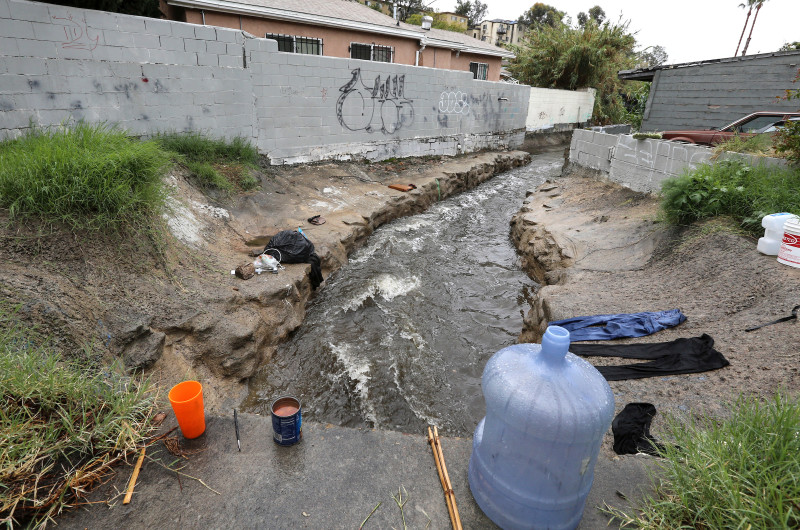
By Matt O’Malley and Drevet Hunt | Originally published on Voice of San Diego January 27, 2017
Our bay suffers from industrial stormwater pollution. Environmental groups like San Diego Coastkeeper use enforcement to heal it.
Today, much of the pollution in San Diego Bay and our rivers and beaches originates at industrial facilities, like A-1 Alloys, the scrap metal facility recently featured in a Voice of San Diego article. Working with outside legal counsel at Lawyers for Clean Water, San Diego Coastkeeper filed a lawsuit against A-1 Alloys to protect local waters from the high amounts of pollution running off the facility.
San Diego Coastkeeper and Lawyers for Clean Water use objective, data-driven methods to identify the most egregious polluters and prioritize efforts to halt pollution at its source. The targeted facilities are not the victims of a “dark lottery,” as sensationalized in the VOSD article. They are facilities with documented failures to meet the most basic requirements of the law.
Like A-1 Alloys, whose pollution levels were hundreds of times above the legal limits, targeted facilities are failing to bring polluted discharges under control.
Controlling stormwater pollution is tough. Rain falling on industrial facilities becomes contaminated with toxic pollutants and flows untreated into our rivers, bays and beaches. To protect our irreplaceable waters, the state of California requires industrial facilities to comply with the stormwater permit adopted under the Clean Water Act. This permit allows facility owners to discharge pollutants into San Diego’s environment – up to a point. In exchange, the owners must implement measures that reduce pollution flowing from their facilities.
When businesses don’t comply, our fishing economy, our tourism industry, the health of the water our children swim in and our ecosystem will continue to suffer as massive pollution collects from different sources across the county.
Many businesses do not take stormwater permits seriously. Luckily, the Clean Water Act allows for citizen enforcement, which plays a vital role in ensuring compliance with the rules that protect us all, as recognized by the executive officer of our Regional Water Board.
In the case of A-1 Alloys, the National City facility was located near the San Diego Bay, making the high level of metals running off the site particularly problematic. After initiating our lawsuit, we worked with A-1 Alloys to understand the issues it faced and implement measures to protect our waters and allow the business to thrive.
After months of discussions, A-1 Alloys owner Jerry Williams made the choice to close the facility rather than reduce pollution. According to Voice of San Diego, that facility employed 14 people and “did a few million dollars a year in business.” The cost of compliance was only a small fraction of this company’s annual revenue — the article fails to address this discrepancy.
The way that the Voice of San Diego covered the story of A-1 Alloys paints a distorted picture of citizen enforcement of environmental law in California. The truth is that we need more citizens stepping up to stop polluters. The State Water Board recognizes this need and the many successes of citizen enforcement, including those in San Diego.
For 21 years, San Diego Coastkeeper has supported both the businesses of San Diego’s economy and the water we all share, and profit from, through cooperation and legal action. Our joint lawsuit with Surfrider against the city of San Diego resulted in a 90 percent reduction in sewage spills, ending San Diego’s “sewage-spill-a-day” reputation. Our cooperative agreement with the city of San Diego ensures the implementation of the Pure Water wastewater recycling program, and our lawsuit against the shipyards on San Diego Bay stopped polluted discharges.
With industrial enforcement actions, the goal is to help businesses clean up their act because it sets a positive example and leads to improved industry standards as a whole. Some businesses throughout San Diego County flout the law, failing to obtain or even attempt to comply with the required stormwater pollution permits. These businesses deserve to be held accountable, just like A-1 Alloys, because their actions create pollution that harms us all. The solution is not to look the other way because a business claims it “tried to follow the rules.” Nor is the solution to point the finger at someone else or the regulatory system as a whole.
While it is unfortunate that a business making millions would shut down one of its locations rather than follow the law, we cannot allow our community to bear the costs of pollution abuses that impact our health and waters. As our federal government appears positioned to undo the many gains the environmental community has made over the last 40 years, this work is critical.
Every person in San Diego has a right to clean water, and our enforcement efforts are part of the solution to creating fishable, swimmable water and a safe, healthy environment for all.
Matt O’Malley is executive director of San Diego Coastkeeper and Drevet Hunt is a partner at Lawyers for Clean Water.

Communications Consultant Lola Dvorak supports CCKA’s strategic communications by helping waterkeepers tell their stories.



